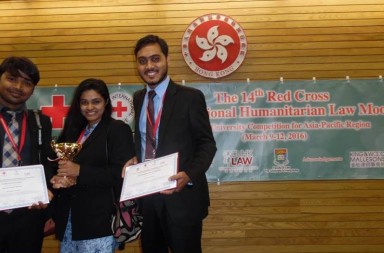This article first appeared in the Dhaka Law Review Blog (dhakalawreview.org)
By Shyikh Mahdi
I can still remember the day when I finally received the confirmation of my admission to the most prominent law school of the country. At once the things that swayed in my mind were a complete feeling of juggernaut in perspective. “Whoa, really? Am I going to be one of ‘Them’?” I was mesmerized and started feeling the royal flavor of studying law, dreaming of engaging with a group of smart and dedicated people fighting for justice, who are respected and honored by all. And of course, the conventional thinking also stroke up into my mind that lawyers lead a luxurious life of eating, sleeping and even breathing money anytime anywhere!
Quite shamefully, I must admit, the financial perks popped up blatantly into my young psyche. Justifiably, however, it would be very unusual if someone from a country like Bangladesh does not consider the possibility, since the pressing needs of the family is a crucial factor for the undergraduate students. Even the peers and the society create this illusory idea of success on to the psychology of many law students; and it is not surprising at all, I suppose.
Soon the expectations started spurring. The lonely kid who once used to make toy planes and dream of becoming a scientist, now started wanting to be the best lawyer, the best judge, and the best at everything else together. Later on, I got to know about the goals and dreams of my friends; the diversity and brilliance of their ideas never ceased to amaze and inspire me. But we accepted the fact that the system through which we have been grown up coupled with family pressure and passion or even fate brought us all together to be the law students; and here we are carrying heavy logs of books throughout the years.
The upshot of the beginning at the law school, with ‘elvish’ languages and scriptures (that was Latin, of course!) started shocking me. The glossy black of the cozy suit of my ‘Dream Lawyer’ soon started fading away into grey. After a month of attending lectures throughout the day, I felt the first bite of the grinding reality of being a law student; and I guess none else had felt the different. Even after months the situation remained almost the same, and it pushed me to ask myself constantly – where exactly I would end up after obtaining a law degree?

Law Professors seem like this in the first months at the Law School
Countless hours on Google, expert opinion and bitter personal experiences helped me figure out that there are four basic features a law student must acquire today. These are firstly, a firsthand experience on legal practice and research, preferably from an expert, or a chamber; secondly, an experience of internship/volunteering on relevant fields; thirdly, extra-curricular activities like moot court or debate; and finally, to have a publication or two in the reputed newspapers or journals. When I started looking for options to attain these skills, acrid reality struck, savoring the agony of failure and hopelessness of a fresh undergraduate student.
Let us face the harsh truth – getting an internship or volunteering opportunity or even publishing a write up is next to impossible unless you have strong connections and proper networking. A few privileged students make it to the moot courts or debates and hardly anyone in this country would publish a piece written by a ‘law student’ unless the content and grammar of the write-up gets editorial thumbed up.
The reasons are pretty apparent. Being a developing country, the extent of professional culture among the legal analysts and scholars in Bangladesh is yet to reach the optimum level, especially in comparison to that of some other neighboring countries. Apart from gross politicization and corruption in every sector, the culture of law practice makes it very difficult for young lawyers to learn and shine. The judiciary is keeping up the orthodox view, and judicial activism is not very welcomed today. Corporate and other specialized sectors including intellectual property law, sports and media law are still at their infancy. Despite having the required capacity and skills, these issues cause hindrance to Bangladeshi law professionals to walk into the booming international market of law practice and legal scholarship.
Most importantly, the socio-economic reality and overpopulation have squeezed the opportunities for fresh law graduates. Lack of market orientation to legal profession and inspiration in the academic level combined with the dilemma of choosing the right profession result in severe frustration among them too.
However, the gloomy light at the end of the dark tunnel is now shining. The country is witnessing a paradigm shift in the legal arena where a bunch of young minds started to think and act differently. Lots of new initiatives, creative ideas, success stories and inspirations are floating around. With a perfect plan, proper timing and the right courageous push, you can start the new wave. The movement of culturing up law students with the notion of law reviews in the new horizon of legal excellence has started already. However, the global trend of legal startup and entrepreneur-ism has yet not hit our national legal scene the way it is supposed to be, but the changes can be sharply felt.
Smart use of online and social media platforms could be the future of legal business in Bangladesh. Access to justice can be ensured up to the root level by introducing user-friendlier tech modes of providing service, especially mobile phones. Simple software and memory storage in a laptop can replace the rows of clogged bookshelves in a posh law chamber or in court-rooms. This way the concept of legal research can be revitalized.
Our smartphone may find the very basic legal solutions from the app we just bought from a Tech-Lawyer of Bangladesh. Starting a peer reviewed ‘open for all’ law journal, running a website with updated legal news, judgments and analysis or even profiling and disseminating lists of local and affordable practicing lawyers can be an inspiration for a startup. Such simple but effective ideas and concepts may change the attitude and awareness of people around us. In a bigger scale, the whole legal scenario will have a positive change. To mark the beginning as a law professional is the hardest part, and the key to unlock the future is at our hands.
The new dawn has come with the shining lights over the whole legal universe; now let us think- would it show us the way?




